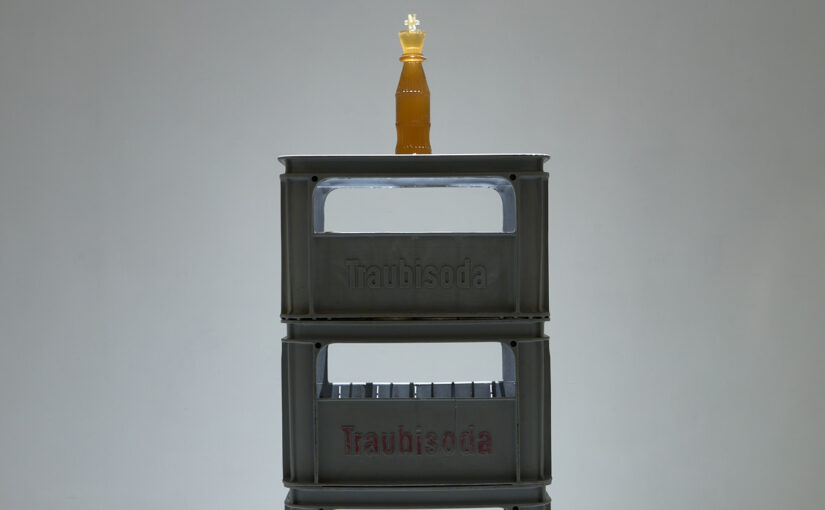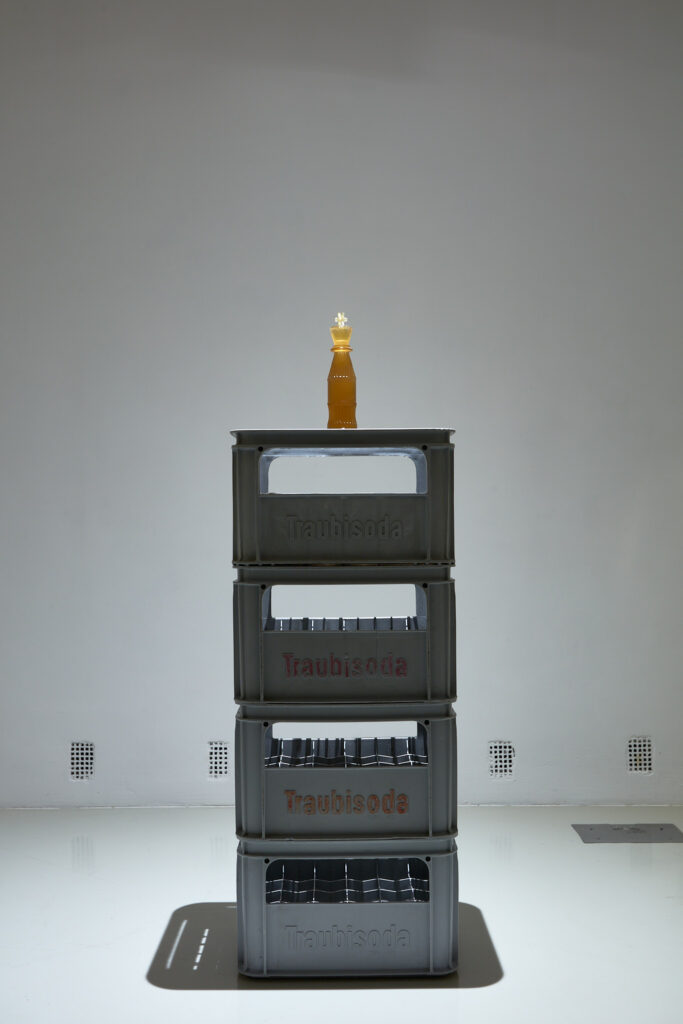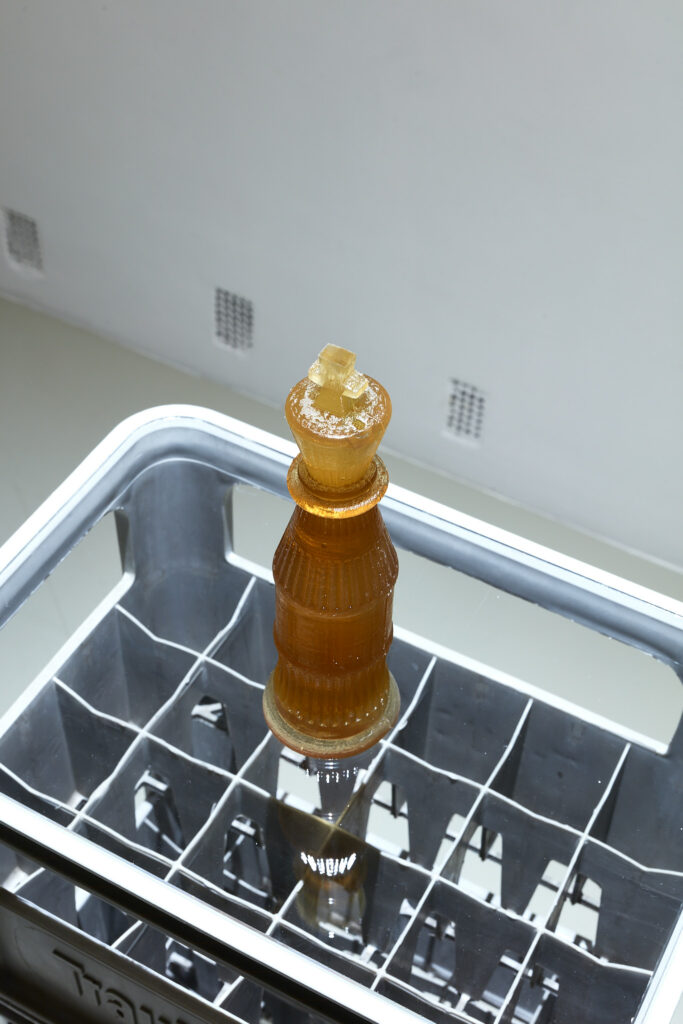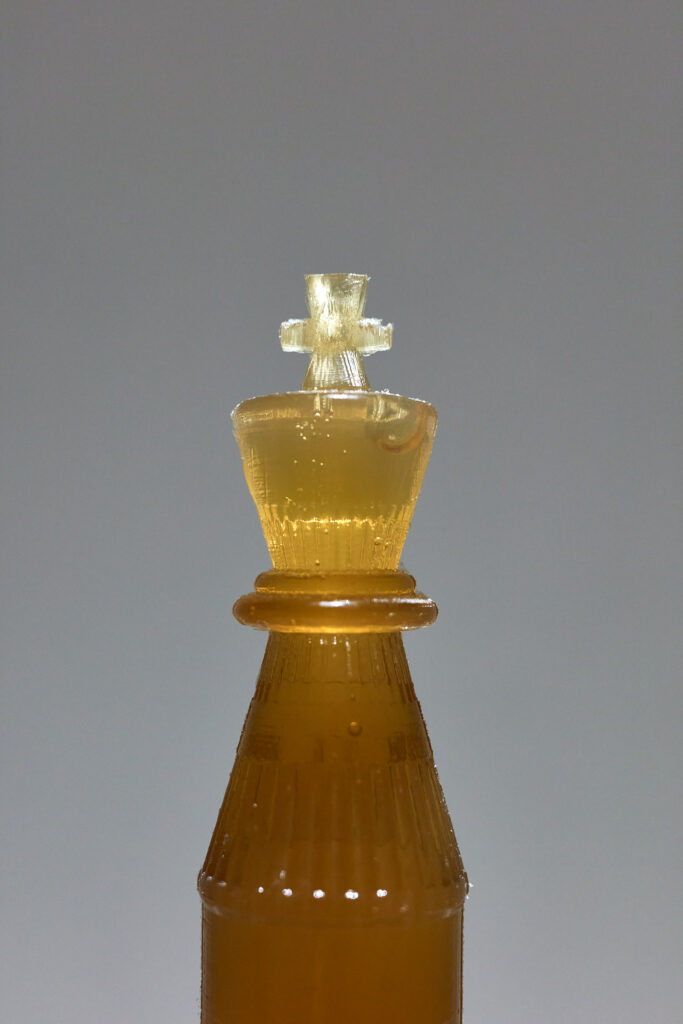Kóser étkezési zselatin, ásványvíz, kóser szőlőlé, étkezési sav (E330), karamellizált cukor (E150a), 7,5 x 23,5 cm
/ Kosher edible gelatin, mineral water, grape juice, edible acid (E330), caramelized sugar (E150a), 7,5×23,5 cm
„Világos, hogy az igazság, amelyet most keresek, nem benne, hanem énbennem van. Az ital keltette fel bennem, de ő maga nem ismeri, legfeljebb szüntelenül ismételheti, bár egyre kevesebb erővel, ugyanezt a tanúságot, amelyet nem tudok megmagyarázni…”1
A mi madeline-tól átitatott teánk, az osztrák receptúra alapján gyártott, de gyakran jellegzetesen magyarnak hitt Traubisodában benne sűrűsödik a rendszerváltás, a privatizáció, a zavarosban halászó vállalkozó alakja, és a vérrel felszentelt palackozó üzem toposza.
Gosztola Kitti kóser zselatinból és szőlőléből készült művének kiindulópontja a szocialista korszak jellegzetes üdítőitala, a Traubisoda. Az 1990-es évek zavaros gazdasági folyamataira jellemzően a Traubit két cég is gyártani kezdte és hosszú jogi csatározás vette kezdetét az osztrák licensz kapcsán. Az egyik cég tulajdonosa Salamon Berkowitz magyar származású ortodox zsidó üzletember volt, aki kóser termékként próbálta újraéleszteni a Traubit. A 2000-es évek elején egy kedvezőbb jogi fordulat után Berkowitzék nagy pénzből terveztek Traubi-kampányt – a felkért reklámszakemberek álmában városról városra vándorló sakkszimultánok során igazolták volna a Polgár-lányok a termék „minőségi, magyar és kóser” jellegét. De hiába volt pecsét az üvegen, Berkowitznak már a kóserságot sem ismertékik el. Közel két évtizedig folytak az ütésváltások a zsidó hivatalosságokkal és a rivális Traubi gyárral, amíg ki nem ürült a sakktábla: ítéletek mondták ki, hogy a kóser Traubié az igazi íz, a liszensz viszont a sertészselatint is tartalmazó riválisé. Utóbbi még felvett egy EU-s támogatást, majd köddé vált. Nincs többé Traubi-íz.
Gosztola Kitti az anyag választásával előre bekalkulálta a műtárgy amortizálódását, így reflektálva az általa választott történet mulandóságára.
„Bűvös öröm áradt el rajtam, elszigetelt mindentől, és még csak az okát sem tudtam. Azonnal közömbössé tett az élet minden fordulata iránt, a sorscsapásokat hatástalanná, az életnek rövidségét egyszerű káprázattá változtatta, éppúgy, mint a szerelem, s minthogyha csak megtöltött volna valami értékes eszenciával: jobban mondva, az eszencia nem bennem volt, én voltam az.”2
1 Marcel Proust: Az eltűnt idő nyomában
2 Marcel Proust: Az eltűnt idő nyomában
Traubisoda, a soda produced according to an Austrian recipe but often considered distinctively Hungarian, is, for Hungarians, sort of like Proust’s famous cup of tea with the crumbs of a Madeline. It is imbued with the memories and scents of regime change, privatization, the figure of the entrepreneur fishing in murky waters, and the plant, consecrated with blood, where the drink was bottled.
Kitti Gosztola’s work, which is made of kosher gelatin and grape juice, takes this memorable soft drink of the socialist era, Traubisoda, as its point of departure. As was not uncommon in the economically turbulent years of the first decade following the fall of the socialist regime, Traubi was produced by two companies, and there was a long legal battle over the Austrian license. One company was owned by Salamon Berkowitz, a Hungarian-born Orthodox Jewish businessman who tried to revive Traubi as a kosher product. In the early 2000s, after a favorable legal turnaround, the Berkowitz family planned a Traubi campaign that would involve significant financial investment. They hired advertising experts who conjured the following vision: the Polgár girls, famous Hungarian chess champions, would travel from town to town playing chess games and testifying to the quality of Traubi as a “Hungarian, kosher” beverage. But alas, despite the seal on the bottle, Berkowitz could not have Traubi recognized as kosher. For nearly two decades, the Jewish officials and the rival Traubi factory traded blows until the chessboard was empty: judgments were issued according to which the kosher Traubi was the real flavor, but the license belonged to the rival version, which, however, contained swine gelatin. The latter even grabbed an EU subsidy and then disappeared. No more Traubi flavor.
By choosing this as her material, Kitti Gosztola has anticipated the amortization of the work of art, and she thus reflects on the transience of the story she has chosen to tell.
„An exquisite pleasure had invaded my senses, something isolated, detached, with no suggestion of its origin. And at once the vicissitudes of life had become indifferent to me, its disasters innocuous, its brevity illusory – this new sensation having had on me the effect which love has of filling me with a precious essence; or rather this essence was not in me it was me.”






